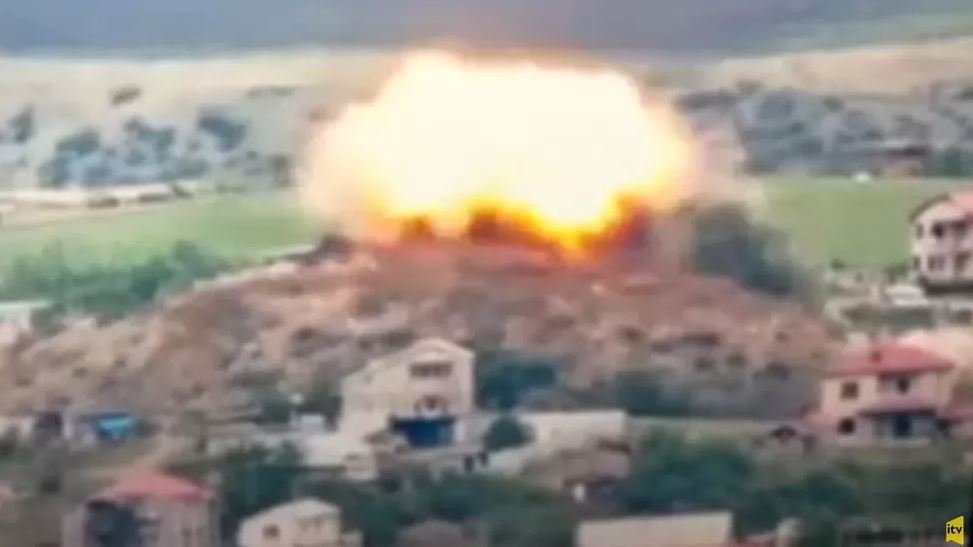Azerbaijan launches attack against Armenian forces

Sep 19: Azerbaijan’s defence ministry said Tuesday it had begun an “anti-terrorist” campaign in the disputed Nagorno-Karabakh region, as Armenian media and local authorities reported heavy bombardment of the regional capital of Stepanakert.
Nagorno-Karabakh, an ethnic Armenian enclave that is internationally recognized as part of Azerbaijan, has been the cause of two wars between the neighbours in the past three decades, most recently in 2020.
Tensions have been simmering around the region for months, after Azerbaijani troops blockaded the Lachin corridor in December, cutting off the only road connecting Nagorno-Karabakh to Armenia and preventing the import of food to its roughly 120,000 inhabitants.
The Azerbaijani defence ministry said in a statement Tuesday it launched “local anti-terrorist activities” to “suppress large-scale provocations in the Karabakh economic region,” and “to disarm and secure the withdrawal of formations of Armenia’s armed forces from our territories.”
The ministry claimed its army had come under “systematic shelling” from Armenia’s armed forces, adding that its action was designed to “neutralize their military infrastructure” and “ultimately restore the constitutional order of the Republic of Azerbaijan.”
“Only legitimate military targets are being incapacitated,” it added.
It said Armenia had fortified its positions, “bringing units to a high level of combat readiness,” and that mines had been planted in previously de-mined areas. The ministry also claimed one Azeri vehicle had struck a mine and two civilians had been killed.
Armenia’s defence ministry wrote on X, formerly known as Twitter, to deny Azerbaijan’s claims that Armenian forces had opened fire on Azeri combat outposts.
Armenian news agency Armenpress said the city of Stepanakert City was under heavy Azerbaijani bombardment, and that mobile and internet connections had been disrupted.
The report was echoed in a statement from the Foreign Ministry of Artsakh, the Armenian term for Nagorno-Karabkh.
“Recently, the Azerbaijani side has been carrying out daily troop transfers and stockpiling of various weapons, which were accompanied by intensive information and propaganda activities, preparing the ground for large-scale aggression against Artsakh.
“Now we are witnessing how Azerbaijan, in order to implement its policy of genocide, is moving towards the physical destruction of the civilian population and the destruction of civilian objects.”
CNN has been unable to verify the claims of either side in the conflict.
Earlier this month, Armenian Prime Minister Nikol Pashinyan said Azerbaijan had concentrated troops on the border with Armenia and the dividing line with Nagorno-Karabakh, and warned of a possible escalation.
“Over the past week, the military-political situation in our region has deteriorated significantly,” Pashinyan said. “The reason is that Azerbaijan has been accumulating troops along the contact line of Nagorno-Karabakh and the Armenian-Azerbaijani border for several days now.”
The previous war, which ended in a crushing defeat for the de-facto Nagorno-Karabakh state backed by Armenia’s government, lasted 44 days. Russia, a long-term ally of Armenia, but which has also recently strengthened ties with Azerbaijan, helped end the war by negotiating a ceasefire.
The deal provided for around 2,000 Russian peacekeepers to deploy to Nagorno-Karabakh to guard the Lachin corridor.
The Russian Foreign Ministry said it was deeply alarmed by the sharp escalation in the region.
“(The) Russian side urges the conflicting parties to stop the bloodshed, immediately cease hostilities and return to the path of political and diplomatic settlement,” foreign ministry spokeswoman Maria Zakharova said Tuesday.
“In the current situation, the Russian peacekeeping contingent continues to fulfill its tasks…The command of the Russian peacekeeping contingent is in constant contact with representatives of the Armenians of Karabakh and the Azerbaijani authorities with the aim of a ceasefire and a return to the implementation of the mentioned trilateral agreements at the highest level.”
(CNN)









Leave Comment